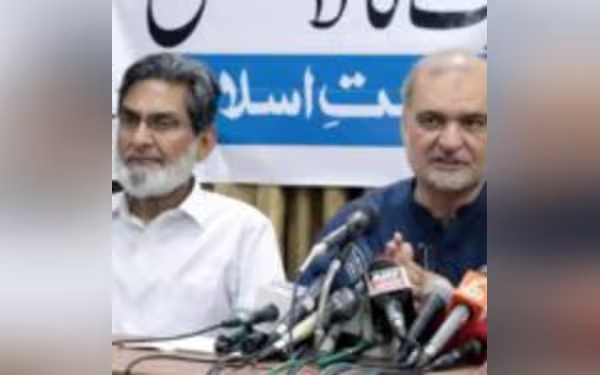Saturday, November 16, 2024 05:37 PM
Hafiz Naeem Criticizes Unconstitutional Term Extensions in Pakistan
- Hafiz Naeem labels term extensions as unconstitutional.
- Government pressure on parliament undermines democracy.
- Judicial appointments manipulated for political interests.
 Image Credits: pakistantoday
Image Credits: pakistantodayHafiz Naeem criticizes unconstitutional term extensions and calls for transparency in Pakistan's governance.
In recent developments in Pakistan, the debate surrounding the extension of service terms for key officials has intensified. The Army Chief and Supreme Court judges are at the center of this controversy, with many questioning the constitutionality of such extensions. This issue has sparked significant public discourse, particularly among political leaders and parties who are concerned about the implications for democracy and governance in the country.
Hafiz Naeem ur Rehman, the Chief of Jamaat-e-Islami Pakistan, has emerged as a vocal critic of these extensions. During a press conference held in Mansoorah, he expressed his strong opposition, labeling the moves as "unconstitutional" and "undemocratic." He emphasized that these actions not only undermine the authority of the parliament but also reduce elected representatives to mere "rubber stamps" for the government’s decisions. This sentiment resonates with many citizens who feel that their voices are being sidelined in the political process.
Furthermore, Hafiz Naeem accused the government of exerting pressure on parliament members to facilitate these constitutional amendments. He argued that such practices erode the democratic fabric of the nation and compromise the integrity of legislative processes. His remarks highlight a growing concern among the populace regarding the transparency and accountability of government actions.
In addition to his criticism of term extensions, Hafiz Naeem also addressed the issue of judicial appointments. He condemned what he described as the government’s manipulation of these appointments, suggesting that they serve political interests rather than the rule of law. This manipulation, he argues, poses a significant threat to the independence of the judiciary, which is a cornerstone of any democratic society.
Hafiz Naeem did not shy away from discussing the historical context of privatization policies, particularly those introduced by the Pakistan Peoples Party (PPP). He contended that these policies have led to the deterioration of public institutions and have been a breeding ground for corruption. His concerns extend to the privatization of public assets, which he believes has resulted in exploitation by Independent Power Producers (IPPs). He specifically warned that such privatization efforts could have detrimental effects on public services, including education.
As he concluded his statements, Hafiz Naeem reiterated Jamaat-e-Islami's commitment to opposing any measures that threaten public welfare. He called for greater transparency and accountability in the management of public assets and legal matters concerning IPPs. His passionate plea reflects a broader desire among citizens for a government that prioritizes the needs of the people over political expediency.
In summary, the ongoing debate over the extension of service terms for the Army Chief and Supreme Court judges raises critical questions about the state of democracy in Pakistan. As political leaders like Hafiz Naeem ur Rehman continue to voice their concerns, it is essential for citizens to remain informed and engaged in discussions about governance, accountability, and the future of public services in their country. The path forward will require a collective effort to ensure that the principles of democracy are upheld and that the voices of the people are heard.













